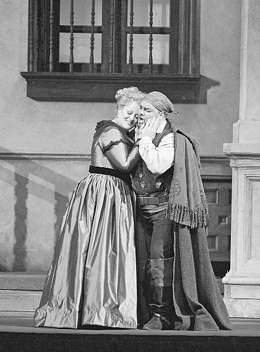Verdi gets trounced and May 20 is too long to wait for Volpe’s departure
On May 20, Joseph Volpe will celebrate his retirement as general manager of the Metropolitan Opera with a lavish gala performance. On February 24, a disastrous revival of Verdi’s “La Forza del Destino” demonstrated why this retirement is long overdue.
“Forza” demands six world-class soloists, a brilliant conductor and a dramatically engaging stage production—a tall order, but just the sort of challenge at which the Metropolitan should excel. Volpe’s Met managed to get practically everything hideously, heinously wrong. This wasn’t a night when you could say, “Well, the tenor was a little underpowered and the production has seen better days, but Verdi triumphed after all.”
No, this was a night when Verdi got trounced.
So was there nothing at all decent about this performance? No, I didn’t say that. In the secondary role of the monk Melitone, veteran baritone Juan Pons delivered a solidly idiomatic performance and even won a few laughs. But who goes to “Forza” for the Melitone? That leaves five other parts to be cast, or, in this case, miscast, by the committee of administrators to whom Volpe has delegated this important responsibility. How could so many people be so wrong so much of the time?
The heavy spinto role of Leonora exposed every flaw in Deborah Voigt’s current vocal estate. Since her dramatic weight loss, the soprano has adopted a brighter, more forward placement. It’s an attractive timbre, but meanwhile a fluttery, intrusive vibrato has crept in. Voigt ran out of steam toward the end of the Convent Scene, lunging unsuccessfully at the climactic high B, then proceeded to sing a hairline flat the rest of the night. She delivered a stunning, long-held high B-flat at the end of her last-act aria, but one note cannot make up for the soprano’s night-long lack of Verdian style.
Opposite Voigt was tenor Salvatore Licitra, who boasts a beautiful natural voice but seems to have only the vaguest notions of vocal technique. When the music soared above the staff, Licitra simply planted his feet and yelled, pumping out a mighty but less than musical noise. Even worse, he just doesn’t sing legato, ever. It’s clean singing, but graceless and cold. Even for a tenor, Licitra is no actor, and suggested nothing of Don Alvaro’s romantically doomed personality.
In an opera that features three major tenor-baritone duets, it’s of vital importance that these two voices blend musically. There’s little chance of that when the baritone is Mark Delavan, whose voice is so throaty as to border on the unmusical. It would be different if Delavan had something interesting to offer as an interpreter, but his idea of subtlety was simply to sing everything loudly, except for the unwritten high notes, which he sang even more loudly. The character of Don Carlo is a Spanish aristocrat, but Delavan made him look like a drunken frat bro.
Even at the peak of his career, Sam Ramey would have been miscast as Guardiano: an elegant basso cantante sounds underpowered in this character’s thunderings. At this late stage, Ramey has not even beautiful tone to offer; by the time his wobble settled down, the opera was almost over. Mezzo-soprano Ildikó Komlósi’s synthetic pep and watery vibrato made Preziosilla even more annoying than usual.
Up to this point, I’ve made little comment on interpretation. That’s because I don’t think any singer living or dead could sing musically under the baton of Gianandrea Noseda. His podium demeanor evoked a flamingo dancing “Afternoon of a Faun” and his choice of tempi suggested he was promised a bonus for completing the opera without going into overtime. Everything was rushed, choppy and noisy, but for all that energy, the performance seemed to drag on for days. (I bolted at 11:40 after “Pace, pace.” Life is short.)
Given such a musical fiasco, it seems almost superfluous to note that the production failed so miserably as drama as well. Lousy opera direction is practically a trademark of the Met under Volpe, but this “Forza” really sets the standard for ineptitude. The sets are massive and yet cramped. For two of Leonora’s most ethereal vocal moments, the prayer in the inn scene and “La vergine degl’angeli,” she is forced to perch on a balcony far upstage. The battlefield scene includes pointless and deafening cannons that, for some reason, disgorge confetti. And the Hornachuelos monastery is supposed to be cloistered; that’s why both Leonora and Alvaro seek refuge there. In this production, the vengeful Don Carlo just ambles right into the chapel without even knocking.
This staging, by Giancarlo del Monaco, premiered in 1996 at a cost rumored to have been more than $4 million; it’s been seen barely a dozen times since. If this is Joe Volpe’s idea of how to run an opera house, the Met is better off without him.
James Jorden is the producer of the podcast “Unnatural Acts of Opera,” at parterre.com.
gaycitynews.com


































